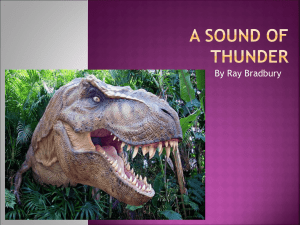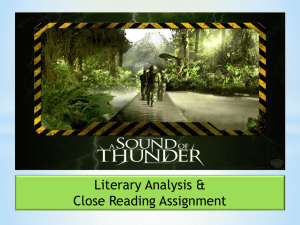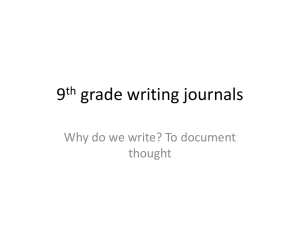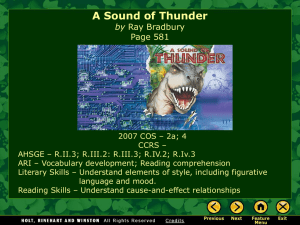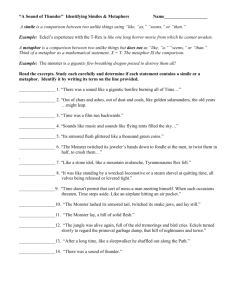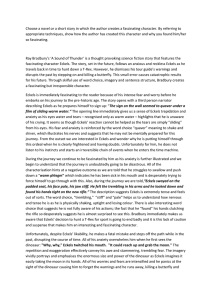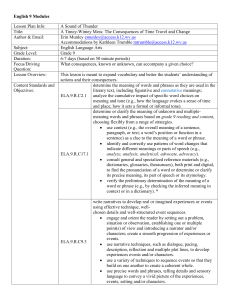A Sound of Thunder: Questions and Answers Analysis
advertisement
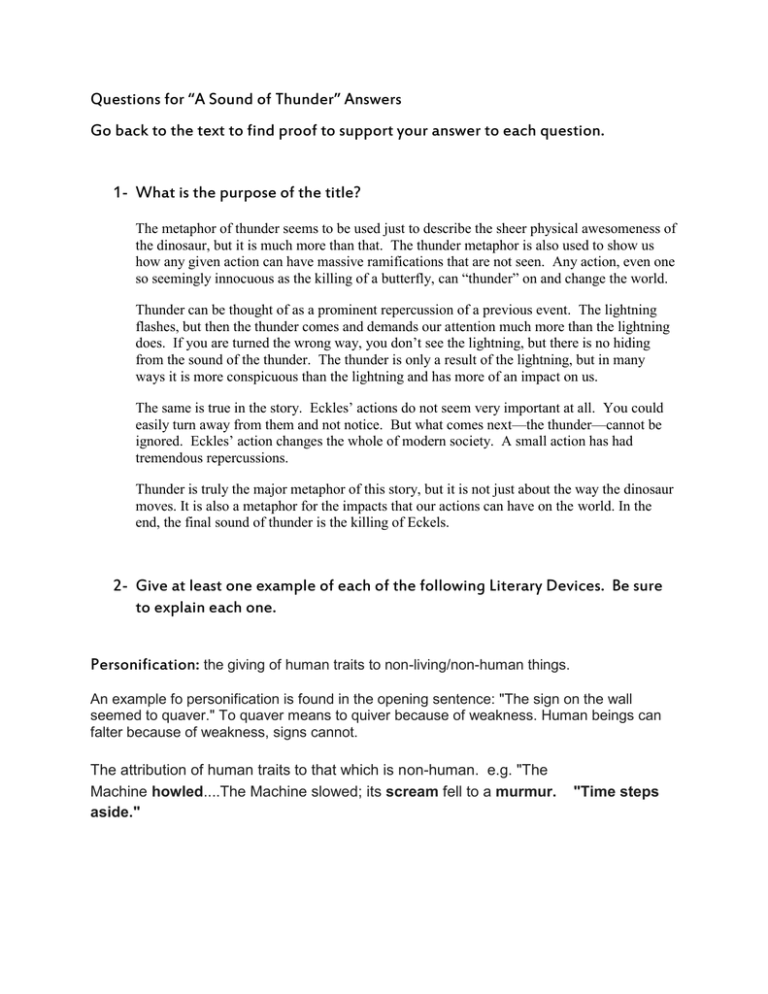
Questions for “A Sound of Thunder” Answers Go back to the text to find proof to support your answer to each question. 1- What is the purpose of the title? The metaphor of thunder seems to be used just to describe the sheer physical awesomeness of the dinosaur, but it is much more than that. The thunder metaphor is also used to show us how any given action can have massive ramifications that are not seen. Any action, even one so seemingly innocuous as the killing of a butterfly, can “thunder” on and change the world. Thunder can be thought of as a prominent repercussion of a previous event. The lightning flashes, but then the thunder comes and demands our attention much more than the lightning does. If you are turned the wrong way, you don’t see the lightning, but there is no hiding from the sound of the thunder. The thunder is only a result of the lightning, but in many ways it is more conspicuous than the lightning and has more of an impact on us. The same is true in the story. Eckles’ actions do not seem very important at all. You could easily turn away from them and not notice. But what comes next—the thunder—cannot be ignored. Eckles’ action changes the whole of modern society. A small action has had tremendous repercussions. Thunder is truly the major metaphor of this story, but it is not just about the way the dinosaur moves. It is also a metaphor for the impacts that our actions can have on the world. In the end, the final sound of thunder is the killing of Eckels. 2- Give at least one example of each of the following Literary Devices. Be sure to explain each one. Personification: the giving of human traits to non-living/non-human things. An example fo personification is found in the opening sentence: "The sign on the wall seemed to quaver." To quaver means to quiver because of weakness. Human beings can falter because of weakness, signs cannot. The attribution of human traits to that which is non-human. e.g. "The Machine howled....The Machine slowed; its scream fell to a murmur. aside." "Time steps Imagery: the formation of mental images based upon the descriptions provided by the author. The better an author appeals to the senses of the reader, the better the mental image. The opening of the story provides a very distinct image: "The sign on the wall seemed to quaver under a film of sliding warm water. Eckels felt his eyelids blink over his stare, and the sign burned in this momentary darkness." Here, the reader is able to create a very distinct mental picture of the scene the author has provided for them. Metaphor: the comparison of two typically dissimilar things. "Time was a film run backward." Here, time is compared to a film running backward. An ustated comparison. The jungle was the entire world forever and forever." "...pterodactyls soaring with cavernous gray wings,gigantic bats of delirium and night fever. "A sound of thunder" = the T-Rex. "the seed death, the green death,..." "Trees exploded in clouds of leaf and branch." "The Monster twitches its jeweler's hands down..." Irony: specifically, verbal irony as something is said that has the opposite effect. e.g. As Eckels talks in the office to Time Safari official, he is told of the dangers of the Time Machine, and he remarks, "Makes you think, if the election had gone badly yesterday, I might be here now running away from the results. Thank God Keith won. He'll make a fine President...." Of course, as it turns out, Deutscher, the opponent, later has won. Later, too, Eckels forgets what the official tells him about: that he is going into the jungle of sixty million two thousand and fifty-five years before President Keith" because when he returns to the ship after having stepped off the gravity path, he ironically says, "I'm innocent. I've done nothing" Simile: - A stated comparison using the words like or as. e.g. Eckels remarks on going back in time to hunt, "This makes Africa seem like Illinois" "Time steps aside (personification). Like (simile) an airplane hitting an air pocket." "I'm shaking like a kid." "There was a sound like a gigantic bonfire." "...like golden slamanders, the old years, the green years (also a metaphor for early years), might leap." Alliteration: - The repetition of initial consonant sounds. e.g. " ...glisteninggreen and gold and...." /g/ Language used for more than its literal meaning. e.g. "They sat in the ancient wilderness. Far birds' cries blew on a wind, and the smell of tar and an old salt sea, moist grasses, and flowers the color of blood." Foreshadowing: There are, indeed, several hints of things to come in Bradbury's short story. When Eckels arrives at the Time Safari, Inc., he swallows hard and "a warm phlegm gathered" in his throat. Evidently, he is nervous about his trip to hunt the Tyrannosaurus Rex. When he asks if the safari guarantees that he will return, the official tells him that his company has no guarantee upon anything but "the dinosaurs." He also adds, If you disobey instructions, there's a stiff penalty of another ten thousand dollars, plus possible government action, on your return." And, as Eckels looks around, he notices a sound like a gigantic bonfire burning all of Time, all the years and all the parchment calendars, all the hours piled high and set aflame. Here are suggestions that something serious may happen with the manipulation of "Time" if things do not go as calculated. As he waits, Eckels talks about the recent election, grateful that the man who has won the presidential election is in office since his opponent would have created a dictatorship. The official assures him that all he has to worry about is shooting his dinosaur. The foreshadowing here is that the outcomes of the present time may change, Eckels may have trouble shooting his dinosaur, and he may have to pay a penalty for disobeying instructions. 3- When does the story take place? “A Sound of Thunder” is science fiction story set in the future. It takes place in the year 2055, and they travel back in time to the time of the dinosaurs. The story opens at Time Safari, Inc. It is a time travel company. They have this sign. TIME SAFARI, INC. SAFARIS TO ANY YEAR IN THE PAST. YOU NAME THE ANIMAL. WE TAKE YOU THERE. YOU SHOOT IT. 4- Why must the hunters stay on the path? He is told to stay on the path, because if they leave the path there could be disastrous consequences. Eckels does accidentally step off the path onto a butterfly. Then he changes the future. When they return to 2055, there is a new president and things are spelled differently. 5- What could happen if one strays from the path? Explain. This story is an exploration of the law of unintended consequences. If you make one small action, it can have a ripple effect—the butterfly effect. 6- What happens to Eckels at the end of the story? Why? Travis shoots Eckels. We learn that words are spelled differently, and the man they didn’t want in office is president. 7- What is a theme of the story? How do you know? It is a lesson in how actions can have widespread unintended unforeseeable consequences. The story reminds readers how a self-absorbed attitude and lack of respect can have disastrous results. Thinking that money is a solution to all problems is also a very modern problem. 8- Show and explain at least two examples of cause and effect. “A Sound of Thunder” is a good example of cause and effect relationships. The famous butterfly effect states that a small thing can make a huge difference, like a butterfly flapping its wings and creating a hurricane. In this story, stepping on a butterfly completely changes the future. Here are some cause and effect relationships in the story: CAUSE: Someone invents a time machine. EFFECT: A company finds a way to use it for profit. Someone figured out that people would love the once in a lifetime experience of killing a dinosaur. Rich people will pay big money for unique experiences. CAUSE: You kill an animal in the past that was not just about to die. EFFECT: it changes the future. The idea that changing the past changes the future is common in science fiction and time travel stories. This is why the hunters mark a clear path and choose which animals are about to die, so changes in the past don’t affect the future. CAUSE: Eckels leaves the path. EFFECT: He steps on the butterfly. If he had not left the path, he presumably would have been fine. The travel agency has been successful many times in the past. Here’s one last cause and effect relationship for you. CAUSE: Eckles changes the future by stepping on the butterfly. EFFECT: Travis kills Eckels. What does Eckels have to be careful of ? There are a few very significant things about which Eckels must be extremely cautious as he embarks upon his hunting trip for the monstrous Tyrannosaurus Rex: 1. He must strictly obey his guide, shooting only when and what he is told to. If he does not comply, Eckels could have a $10,000 fine imposed upon him, as well as other penalties. 2. He must also be careful not to be eaten. The company has lost guides and many tourists because of the dangers incurred. 3. He must be diligent in remaining upon the anti-gravity path that hovers above the ground, a path which the company has made to ensure that nothing in the environment is altered by modern man's presence. The guide tells him, "We don't want to change the Future. We don't belong here in the Past. The government do esn't like us here. We have to pay big graft to keep our franchise. A Time Machine is finicky business. Not knowing it, we might kill an important animal, a small bird, a roach, a flower even, thus destroying an important link in a growing species.... A little error here would multiply in sixty million years, all out of proportion. In others words, one small change can alter the balance of nature and cause amazing changes over time. This connectivity of nature is called "the butterfly effect," and Bradbury uses this butterfly as the victim of Eckels slip off the anti-gravity path. And, because Eckels returns with a butterfly on his shoe, all sorts of changes have taken place.
